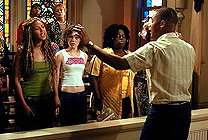|
|
|
|
The
Fighting Temptations
|
 |
|
The Fighting Temptations is the perfect example of a movie in which elements like plot, character and a moral message are a mere pretext for something else: in this case, many wonderful scenes of communal singing. The story is minted from a dozen old musicals. Darrin (Cuba Gooding Jr) is a fast-talking, big-city advertising man down on his luck. He decides to visit his hometown back in Georgia in order to attend the funeral of his beloved Aunt Sally. At the reading of Sally's will, Darrin discovers that he is coming into a lot of money – but only if he takes charge of the local church choir and leads it to victory at a Gospel Explosion contest. However, the choir turns out to be a motley crew which requires decisive augmentation. Enter the object of Darrin's desire, Lilly (Beyoncé Knowles). She is beautiful, a single mother, and the hottest singer on the local bar circuit. Introducing her into the choir – alongside a few teenagers, an old bluesman and several convicts in chains – causes understandable consternation among conservatives. You know where this movie is going within its first five minutes. Darrin is going to have to discover some old-fashioned values of loyalty and honesty, and the rigid elders of the community are going to have to loosen up. Hen-pecked types will learn to stand up for themselves, and sad outsiders will come to feel part of one great, spiritual family. Now forget all that. There is nothing remotely authentic in this movie's depiction of musical culture, but director Jonathan Lynn (The Distinguished Gentleman, 1992) – an old hand at this kind of divertissement – knows how to make the scenes of gospel music really swing. In fact, we get a panorama of performance styles. Beyoncé's rendition of "Fever" is pure nightclub material. Reverend Shirley Caesar whips up the religious fervour of churchgoers with her old-style gospel delivery. Bits of hip hop and rhythm'n'blues are jammed, rather hilariously, into the mix. There is a barbershop trio actually singing in a barbershop. Darrin, with increasingly childlike energy, bounces joyously as the conductor of it all. It's not quite The School of Rock (2003), but it's fun. And the film's flimsy moral message? A nostalgic one, indeed – that it is better to fight lustful temptation than give in to it – but, oddly, in this context the sermon almost makes sense. Only the almighty power of sublimation could give rise to such divine singing. MORE Lynn: The Whole Nine Yards © Adrian Martin March 2004 |
![]()